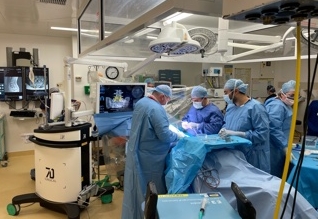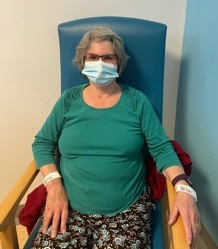Southampton experts first in UK to use groundbreaking 'GPS navigation' technology for spinal surgery
Southampton experts first in UK to use groundbreaking 'GPS navigation' technology for spinal surgery
Surgeons in Southampton are the first in the UK to perform spinal surgery using groundbreaking 3D technology similar to GPS navigation systems used in self-driving cars.
The state-of-the-art equipment, known as the 7D Surgical System, enables surgeons to see the spine using highly-developed camera technology which creates a three-dimensional real-time image in just a few seconds.
This allows the user to visualise the precise placement of surgical tools and implants – increasing accuracy and reducing the risk of errors.
 It was used by Chris Dare, spinal surgeon and clinical lead for the Wessex Spinal Service at University Hospital Southampton, who said the technology will become the “gold standard” in spinal surgery due to it being accurate, fast, cost-effective and radiation-free.
It was used by Chris Dare, spinal surgeon and clinical lead for the Wessex Spinal Service at University Hospital Southampton, who said the technology will become the “gold standard” in spinal surgery due to it being accurate, fast, cost-effective and radiation-free.
The technology used, known as Machine-Vision Image Guided Surgery (MvIGS), helps spinal surgeons guide their tools to the critical anatomy often millimetres away from the spinal cord using a camera linked to a computer which serves as a visual GPS for the spine.
Unlike conventional image guided-surgery systems that rely on intra-operative radiation, the new MvIGS technology can achieve faster workflow for procedures, reducing operative time for patients and eliminating unnecessary radiation exposure.
Patient registration time is also reduced from 30 minutes to 20 seconds which further streamlines the process.
 Mr Dare said: “This technology enables us to insert spinal implants around vital structures with even greater precision. Highly complex interventions can be carried out faster and with fewer complications.
Mr Dare said: “This technology enables us to insert spinal implants around vital structures with even greater precision. Highly complex interventions can be carried out faster and with fewer complications.
“In addition to improving patient safety, the new high-tech system has the added advantage of reducing harmful radiation exposure for both patients and staff.
“We are delighted Southampton is the first in the UK to evaluate the kit as it supports our continued efforts to adopt revolutionary technology and improve clinical outcomes for our patients.”
He added: “Given all of these benefits, I have no doubt navigation will become the gold standard for spinal surgery.”
 Mrs Myra Edmunds, 68, from Woolston in Southampton, is the first patient in the UK to undergo this type of spinal surgery.
Mrs Myra Edmunds, 68, from Woolston in Southampton, is the first patient in the UK to undergo this type of spinal surgery.
“I have suffered with nerve pain in my legs for six years and this has had a massive impact on my quality of life and has been quite debilitating at times,” she said.
“Mr Dare has been amazingly supportive and we have spoken through all the treatment options available to me at length.
“Spinal surgery is quite a daunting one because of the risks involved so when I was offered this option, which could correct the problem altogether with reduced risk of error, it was a no-brainer.”
She added: “I feel very fortunate to be the first patient in the UK to undergo this type of surgery and hope others will benefit from it soon.”
The technology is currently subject to a clinical evaluation led by One Surgical, the UK based company introducing this platform, at three sites in the UK.
Jon Kemp, director of One Surgical Ltd, said: “We have followed this technology for several years and waited in anticipation for its regulatory approval here in Europe, so we are delighted to offer this new era of spine technology to help improve patient outcomes."
Updated: please note that the clinical evaluation period has now ended at UHS.
Posted on Wednesday 21 April 2021